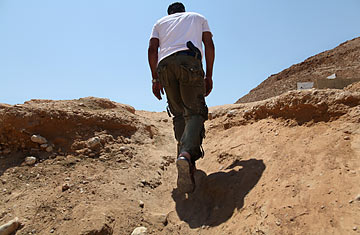
A Bedouin smuggler walks outside of Quseima, Sinai Peninsula, Egypt, July 24, 2011.
Quseima is a quiet village built along a desert valley where a natural spring bubbles forth from the ground, feeding a modest crop of olive groves and date palms where the local Bedouin community ekes out an existence. Its outward appearance is unremarkable in this remote section of the eastern Sinai Peninsula, known to three decades of international peacekeeping forces as "Zone C." But Quseima's police headquarters, like those of others in the zone, is a startling sight: gutted by flames and pockmarked by rocket-propelled grenade fire. The burned carcass of an armored personnel carrier sits outside in the blazing sunlight; its turret, guns and interior parts all looted.
Zone C is the last bit of Egyptian territory before the international border with Israel and the Gaza Strip, and it's a zone where — under a long-standing Egyptian-Israeli peace treaty — only Egyptian civilian police are allowed to conduct security. But it has been months since the police have set foot in these parts. "They've all gone home," laughs Mosaad, a powerful leader of the Tarabin tribe, as he drives past the police station, a Russian machine gun wedged between the front seats of his car.
The Sinai may have always been Egypt's wild child; its predominantly Bedouin population alternately neglected and vilified as outsiders by the central government in Cairo. The Bedouin economy is, in turn, largely dependent on illegal smuggling networks moving goods and people into Israel and Gaza. They are never hesitant to express their distaste for the authorities. And for years, that has translated into a tense round-the-clock relationship with the Egyptian Interior Ministry, with the tribal renegades paying off some police, and running from the rest of the force.
But in the six months since a popular uprising ousted President Hosni Mubarak, the Arab world's largest country has seen its security undergo a change for the worse — and, in the badlands of the Sinai, the situation is extreme. On July 30, unidentified gunmen in North Sinai attacked the gas line that transports natural gas to Israel and Jordan — for the third time in one month; the fifth in just under six months. The day before, armed Bedouin, identified by residents and authorities as Islamists, attacked a nearby police station in the North Sinai capital of Al-Arish, leaving at least two dead and 12 wounded.
Some argue that the early days of the revolution presented an obvious harbinger for all of this. On January 28th, when protesters clashed with security forces in cities from Cairo to Alexandria — battling police bullets with stones and Molotov cocktails — the Bedouin in Sinai had already taken it up a notch. "We were launching RPGs [rocket-propelled grenades] and they were the ones throwing the rocks," says one Bedouin smuggler, Abdallah, describing the scene outside the police station in the village of Sheikh Zweid that night. One police officer later told TIME how smuggler friends rescued him from the melee as his colleagues hunkered downor fled. Scores of Bedouin men were among the thousands of prisoners who later escaped from Egypt's overcrowded prisons amid the chaos, or were released by a post-Mubarak transitional government eager to rid itself of some regime skeletons.
Many in Sinai now say they feel freer than they have in years. "Generally, people have relaxed a bit here. The Bedouin have relaxed," says Abu Ahmed, a Sawarka tribal leader, reclining on a cushion in his sandy yard in Rafah, a few miles from the Gaza border. "[Security forces] are not searching us as much anymore. There's no government now. But really, we're waiting for what comes next. Will the next government be like the last one, or will the treatment change? We want stability. But we don't want arbitrary arrests."
Stability is an elusive term in a society now accustomed to operating above the law. A local journalist in the town of al-Arish estimates that it may be three to four years before the police force is allowed back into the towns closest to the border. Asked this week why police still hadn't returned to the area, the Department of Homeland Security's media chief, Gen. Essam al-Bedawi simply said: "You know why."
Shortly after the winter uprising, the Bedouin here sent a message to their longtime police foes: stay out of the smuggler havens of Rafah and Sheikh Zweid or they would be killed. "We have two demands," explains Abu Ahmed. "End the outstanding sentences [against Bedouin], and prosecute the officers who attacked the protesters — both before and after the revolution. And after they do that, I'll go to them and I will invite them back," he says. "Until then, they're forbidden from entering. There's no other way."
